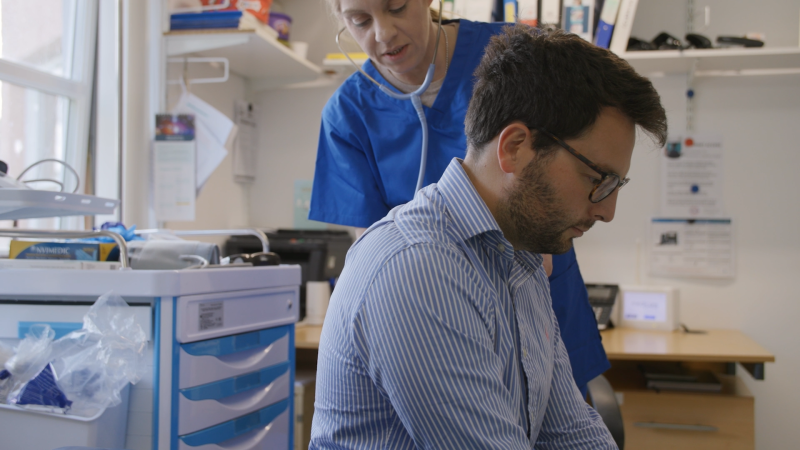Are you concerned that you are drinking too much? Perhaps you have begun suffering from withdrawal symptoms or noticed an increase in how often you consume alcohol. Or maybe you have started longing for a drink whenever you are feeling anxious or sad.
In this article, we will take a look at common signs and symptoms of alcohol misuse so you can understand your behaviour and know when to seek help from a healthcare provider.

What is Considered Alcohol Misuse?
We tend to see alcohol-related problems in black or white – either you have alcoholism, or you don’t. The reality is far more complex. Alcohol issues exist on a spectrum that encompasses various drinking patterns and behaviours.
Medical professionals use the term “Alcohol Misuse” to refer to harmful drinking, i.e. drinking over the recommended limits set by health authorities. It can also refer to someone who drinks less than these limits but has a clear alcohol dependence.
The NHS chief medical officer advises against drinking more than 14 units a week, for both men and women. It is worth noting that a standard drink can contain more than a single unit of alcohol. One unit amounts to half a pint of lager, a single shot of spirits, or two-thirds of a small glass of wine.

Is Alcohol Misuse the Same as Alcoholism?
No, alcohol misuse is not the same medical condition as alcoholism, although the two concepts are related. Alcohol misuse is a broad term that encompasses a range of problematic drinking behaviours. It can include heavy drinking, binge drinking, or experiencing negative consequences due to alcohol consumption.
Alcoholism, clinically referred to as Alcohol Use Disorder (AUD), is defined as a chronic disease characterised by an inability to control or stop drinking despite experiencing negative consequences.
The Diagnostic and Statistical Manual of Mental Disorders outlines criteria for diagnosing Alcohol Use Disorder. These include factors such as an increased tolerance to alcohol, unsuccessful attempts to cut down or control drinking, spending a significant amount of time obtaining or recovering from alcohol use, and physical and psychological alcohol dependence.
While alcohol misuse might be seen as a less severe drinking problem, it is worth noting that someone who is misusing alcohol or drinking frequently may develop an alcohol addiction, which can lead to more severe symptoms. For that reason, it is very important to pay attention to the warning signs of harmful drinking.
What Are the Signs That Someone Is Misusing Alcohol?
There are many indicators when someone’s relationship with alcohol begins to enter dangerous territory. Here is what to look out for.
Mild Alcohol Misuse & Binge Drinking
- Frequent exceeding of recommended limits Regularly drinking over 14 units a week.
- Drinking almost every day: Rarely having a break from alcohol.
- Episodic binge drinking: Engaging in episodes of heavy drinking exceeding six units in a single session.
- Regular hangovers: Suffering physical discomfort after drinking too much alcohol.
- Memory lapses: Not remembering what happened while you were under the influence of drink.
Alcohol Dependence & Addiction
- Consistently exceeding recommended units: Drinking more than 14 units of alcohol every week or regularly binge drinking.
- Developing a tolerance: Requiring more alcohol to feel the same effect, noticing the amount you drink increasing over time.
- Withdrawal Symptoms: Experiencing physical or psychological symptoms when not consuming alcohol, including tremors, anxiety, or irritability.
- Neglecting Responsibilities: Prioritising alcohol use over the rest of your daily life, sidelining work or personal relationships.
- Failed Attempts to Quit: Repeated unsuccessful attempts to cut down or stop drinking.
If You’re Unsure About Your Drinking Habits
The CAGE Questionnaire is a screening tool that clinicians use to detect substance misuse problems. It has a high success rate in detecting problem drinking – even though it consists of just four questions.
Take your time, and answer the following:
1.Have you ever felt you should cut down on your drinking? 2.Have people annoyed you by criticizing your drinking? 3.Have you ever felt guilty about drinking? 4.Have you ever felt you needed a drink first thing in the morning (an "eye-opener") to steady your nerves or to get rid of a hangover?
If you answer yes to two or more of these questions, we recommend you seek out support.
Castle Craig provides a free assessment, so if you are concerned about your drinking, feel free to reach out. Our clinic offers a friendly and caring environment to help you overcome alcohol misuse.
The CAGE questionnaire provides a quick way to assess your relationship with alcohol and can be a valuable tool in promoting self-awareness. It’s also very simple to remember – CAGE is an acronym for the four questions of this preliminary test: Cut, Annoyed, Guilty, and Eye-opener.

Download Our Brochure
What are the Risks Associated with Problem Drinking?
Binge drinking poses immediate risks to your safety, while alcohol addiction and long-term abuse can lead to severe health problems, as well as issues in your personal and professional life. Ultimately, alcohol affects every aspect of your existence, from your physical health to the well-being of your relationships and career.
Short-Term Health Risks
Alcohol use and intoxication have immediate effects on your behaviour, which can put you in dangerous situations. After binge drinking, you are at increased risk of:
- Injuries and accidents
- Fights, aggressive behaviour, and violence
- Risky sexual behaviours, including unprotected sex
- Alcohol poisoning
- For pregnant women, even low-level alcohol use can impact your child’s brain development and increase the risk of Fetal Alcohol Syndrome, organ damage, preterm birth or miscarriage.
Long-Term Health Risks
The long-term health risks of alcohol misuse include:
- Greater risk of several types of cancer (including breast, liver and throat)
- High blood pressure and cardiovascular issues
- Weakening of the immune system, which increases the chance of getting sick.
- Memory problems
- Mental health problems, including anxiety and depression.
Social and Personal Effects
- Strained relationships
- Social isolation
- Impaired job performance or job loss
- Legal problems: DUIs, public intoxication or other.
- Financial strain
By reducing the amount that you drink, you can reduce these short- and long-term risks. This might seem intimidating, but you don’t have to go through the recovery process alone.
Can People With Alcohol Use Disorder Recover?
Yes, people with alcohol problems can and do recover, especially when they receive the correct type of treatment.
A personalised treatment plan, often crafted with the guidance of a healthcare provider, may involve various elements such as behavioural therapies, talk therapy, and participation in support groups or group meetings.
CBT therapy can help to determine and address some of the reasons why you are drinking too much. Alcohol abuse can have many root causes, for example, a family history, environmental factors, or past trauma such as sexual abuse.
Behavioural therapies help you change your patterns. You will learn techniques to overcome stress and coping strategies to fight your alcohol addiction.
Support groups offer a sense of community and understanding. They help to overcome the shame and stigma sometimes associated with alcohol problems. They can also be a crucial aid during the process of stopping drinking – you can have a safe space to discuss the symptoms of alcohol withdrawal.
Recovery is not easy, but with the right support, individuals suffering from alcohol use disorder can and do achieve long-term recovery, rebuilding their health, their mental health, and their lives.




What Should I Do if I’m Concerned About My Drinking?
Early Stages
If you think you might be in the early stages of a drinking problem, you have already completed an important first step: acknowledging the issue.
Once you have noticed the symptoms or warning signs, it is important to set realistic drinking limits for yourself. Keep a record of your alcohol intake – how much alcohol you drink and in what circumstances. This can help you detect patterns in your behaviour and take note of stressful situations or social environments where you are more likely to drink in a harmful way.
Try to prioritise alternative activities that reduce stress and boredom but don’t involve drinking.
Talk about your concerns with friends or family, and consider speaking to a counsellor or joining a support group. It is never too early to take care of your mental health and address your drinking habits!
We are Here to Help you Today
Don’t Suffer Alone. Our Friendly Team Are Waiting to Help You Start Your Recovery Journey.
If You Are Dependent on Alcohol
If you are dependent on alcohol, you will find yourself struggling to stop drinking despite your attempts and suffering from cravings or withdrawal symptoms.
There are many tools and treatment options available for you, and you can recover a happy, balanced life. You have already done the hard work of realising you have a problem. This isn’t easy, and you should be proud of your self-awareness.
Once alcohol addiction has begun, professional help is extremely helpful for recovery. Contact a healthcare provider, like Castle Craig, to discuss a comprehensive treatment plan which addresses both the physical detoxification and the psychological process of recovery.
Medical supervision may be necessary to manage alcohol withdrawal symptoms safely. Therapeutic interventions like counselling or support groups are great for addressing the underlying causes of addiction. Remember, recovery is a process, and seeking professional guidance is a crucial step towards regaining control over your life.
At Castle Craig, we are here to help you. Our team are empathetic, non-judgemental and treatment is completely confidential. We are here to support you on your journey. Get in touch today to discuss treatment options, or arrange a free assessment to discuss your concerns.
-
Related Pages on Alcohol Addiction